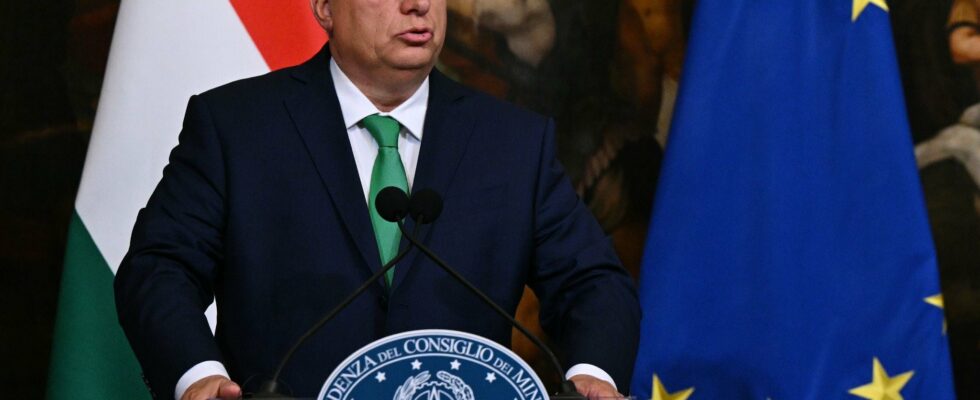It’s no secret that Viktor Orban worships Donald Trump. So much so that the Hungarian Prime Minister borrowed his latest slogan from his American alter ego: “Make Europe Great Again”, a provocative phrase launched as a program for the rotating presidency of the European Union, which Hungary takes over on Monday, July 1. “Make Europe great again”. The promise may come as a surprise coming from the Old Continent’s chief troublemaker. An inveterate opponent of support for Ukraine, a denigrator of the Green Deal, a comrade of Vladimir Putin and Xi Jinping, a gravedigger of the rule of law in his country: the voice of Europe for the next six months will therefore be that of the champion of “illiberal democracy”… “Orban will be torn between the desire to impose a form of respectability in the face of his European partners who see him as the bad boy, and a desire to impose his signature by slowing down certain issues, notably support for Ukraine”, predicts Blanche Leridon, editorial director of the Montaigne Institute and co-author of the note European Union: scope and limits of national populists (April 2024).
“The slogan chosen by Orban reflects the change in the extreme right, which no longer openly calls itself Europhobic and no longer advocates leaving the EU – like the National Rally in France – which has made this movement more acceptable and popular in the eyes of voters, explains the former director of the Jacques Delors Institute Yves Bertoncini who teaches at ESCP. ‘Make Europe Great Again’ means: let’s invest in the European political space but in our own way: to defend European identity, by fighting against immigration; and also to safeguard the European way of life against the ‘ecological technocrats’, who are behind all the measures of the Green Deal, in particular the ban on combustion engines within the European Union by 2035, voted in February 2023.”
18 billion euros, the gaping hole in Orban’s coffers
Faced with the concern raised in Brussels, Hungarian diplomats promise that there is no question of “trolling” this presidency. Even if Orban wanted to, his path would be narrow. “Hungary has every interest in this six-month mandate going well, despite Orban’s love of provocation,” recalls Jean-Dominique Giuliani, president of the Robert Schuman Foundation. “Let’s not forget that 18 billion in community funds intended for this country have remained suspended by the European Commission since 2022 for non-compliance with the rule of law.”
Moreover, tradition calls for restraint in this position. “There is a tacit code of conduct for the State which assumes this role of intermediary, a special position since the State in question is both the arbiter and one of the players” explains Yves Bertoncini. The populist leader also arrives at a slack period for the 27. Not only will the summer break inevitably truncate this mandate, but the time has come for the renewal of institutions following the European elections. “The legislative agenda will not be very dense, specifies Blanche Leridon: the European Parliament has not yet held its inaugural session (scheduled for July 16), the new European Commission is not complete since President Ursula von der Leyen must still be dubbed and each of the 27 member states must appoint its commissioner. This is therefore not a moment of intense production of standards, which should temper Viktor Orban’s attempts to block.
In fact, the roadmap presented by the leader of Fidesz (his far-right party) is intended to be rather consensual. Among the priorities displayed, the European pact on competitiveness, in line with Emmanuel Macron’s Sorbonne speech, the previous Belgian presidency and the great ambitions of the Commission, which promotes the European awakening in the face of Chinese and American competition. “Moreover, Orban promotes an enlargement with variable geometry, rather directed towards the Western Balkans, in particular towards Serbia, continues Blanche Leridon. He also defends a common agricultural policy oriented towards farmers (understand: less ecology).”
Safeguards against Europe’s blackmailer
Unsurprisingly, the two most divisive subjects concern immigration and Ukraine. Since 2022, Viktor Orban has done everything to delay European aid to the country attacked by the Russian army, slow down the implementation of Western sanctions against Moscow, and delay the start of negotiations for Ukraine’s accession to the Union. . This last file was opened under the previous mandate of the Council of the EU. “We have known for months that Hungary will take the presidency on July 1, 2024, the European partners have therefore ensured that the crucial moment of the vote on the accession process takes place before this date,” explains Blanche Leridon.
In Brussels, Orban will not be alone at the controls. “This is not a super EU presidency,” adds the analyst. Power remains distributed among the various European institutions: in addition to the EU Council (which brings together ministers), the European Council (which brings together heads of state and government), the European Parliament and the Commission also carry weight.
However, for six months, Viktor Orban will have a platform in Brussels. He could use it to flatter his friend Vladimir Putin, but also to try to build a “convergence of conservatives” explains Yves Bertoncini. The European People’s Party (EPP) remains dominant in the Strasbourg hemicycle, and even consolidated its opposition during the elections at the beginning of June. Viktor Orban, former member of this EPP, can play a role as a bridge between the extreme right and the conservatives. In this configuration, the risk of Europe being blocked is real.”
An increasingly likely hypothesis: the Hungarian head of government announced on Sunday 30 June his intention to form a new European parliamentary group with the Austrian far-right party and the centrist movement of former Czech Prime Minister Andrej Babis. Its name? “Patriots for Europe”. To sit in the European Parliament as a new political group, this alliance still needs the support of four other European countries.
.
